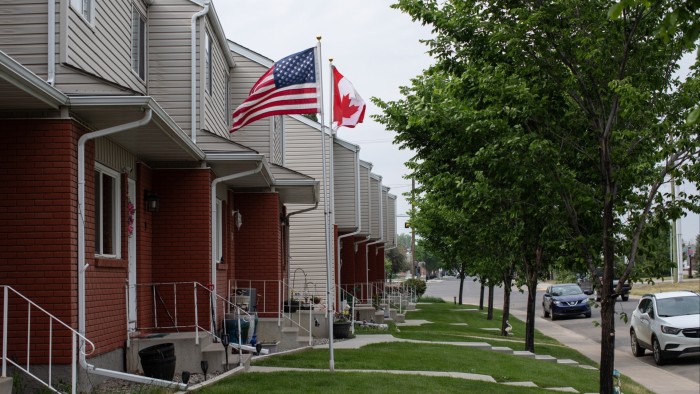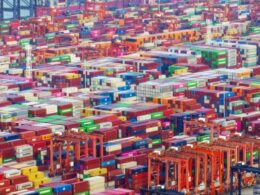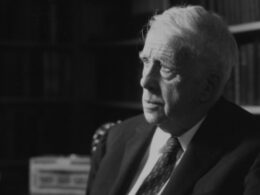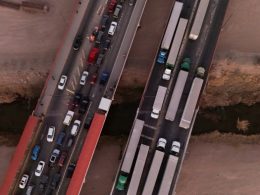Roger Bablitz leans under the bonnet to fix his 1976 purple Chevrolet Stepside pick-up truck, while an American flag billows in the wind nearby.
“Donald Trump, he’s a good guy. I don’t mind him,” he said.
But Bablitz, a 54-year-old single manual labourer, is not in the US. He is in High River, a small town in southern Alberta.
“Becoming the 51st US state wouldn’t hurt my feelings,” he said. “I think it would be better if we do join the States or just separate from Canada.”
Separatist sentiments have been energised in Alberta, the western Canadian province that is the largest foreign supplier of oil to the US and has always considered itself a little bit different than the rest of Canada.
Its independence movement poses a threat to Prime Minister Mark Carney’s push for national unity and his ability to respond to the economic threats unleashed by Trump, the US president.
This turmoil has been amplified by premier Danielle Smith, the 54-year-old United Conservative party leader who regularly rails against Ottawa and has opened the door to an independence referendum.
“Albertans have had enough,” she told the Financial Times in an interview. “Albertans can be pushed and pushed to a point, and then it just boils over.”
Smith said she was against separating from Canada or Trump’s idea of joining the US. But she has turned up the heat on these simmering tensions.
The day after Carney won the national election in April, she introduced a law that lowers the threshold to hold a provincial vote on whether Alberta should breakaway from Canada. From next month, only 177,000 signatures are needed for a referendum petition, down from 600,000.
Dennis Modry, a retired heart surgeon and co-leader of the Alberta Prosperity Project, a “pro-sovereignty, referendum movement”, said a referendum could be held as early as next year. “We already have well over 250,000 people that will sign that petition,” he said.
But the polls tell a different story.
Only 29 per cent of Albertans support the idea of Alberta becoming its own country, according to a May Leger survey, while the Angus Reid Institute reported that at least 36 per cent of Albertans wanted a vote to leave Canada while highlighting similar tensions exist in neighbouring Saskatchewan.
On Monday, the separatist Republican Party of Alberta came third in a by-election dominated by Smith’s United Conservative party.
However, support for independence has jumped by 5 points since 2021, back to levels seen during the pandemic when many voters chafed at Ottawa’s tight Covid-19 restrictions, according to data from Janet Brown Opinion Research.
Smith is walking a fine line. “I’ll let the process play out,” she said. “My job is to make the case for a strong Alberta within a united Canada.”
This week, she launched the Alberta Next Panel, a group of elected officials and business and community leaders that will travel the province holding town hall meetings about how to “stand up to Ottawa’s over-reach” and improve their economy.

Canada is no stranger to an identity crisis. French-speaking Quebec in the country’s east held unsuccessful votes for independence in 1980 and 1995.
Now, it is the west that is voicing its frustration, particularly over how their abundant oil reserves pay for less prosperous provinces.
But even if a “Yes” vote wins more than 50 per cent of the vote, independence could only happen after long negotiations with Ottawa and other provinces. It also has to contend with First Nations groups that are fiercely against the idea.
Since the first railway was built westwards more than a century ago, agricultural and oil-producing westerners have felt resentment towards the “Laurentian elite” who live in the eastern cities of Montreal, Ottawa and Toronto and tend to overlook western provinces’ contributions.
“We continue to be a colony serving the interests of the East,” said Modry. “We are pillaged and plundered for our wealth, we have values shoved down our throats that don’t align with values of people here.”

Albertans predominately vote conservative and regularly find themselves at odds with Ottawa, who they accuse of over-reach or unfair policies that cost them billions every year.
Smith said the anger today is the result of a decade of Liberal party rule under former prime minister Justin Trudeau, whose climate-focused agenda, such as the carbon tax, was “devastating to families” and stifled industry.
“We’ve got legitimate grievances, and I hope that the prime minister realises that it’s in his hands now,” she said. She sent Carney nine energy-focused demands to keep Alberta on side, mostly by rolling back Trudeau-era environmental measures.
Smith, a former radio talk show host, is no stranger to controversy, whether over criticising vaccine mandates or refusing to fall in line with Trudeau’s “Team Canada” united front to counter Trump’s threatened tariffs in February.
Smith met Trump in January at his Mar-a-Lago resort in Florida in a bid to promote Alberta’s energy abundance.
Carney, raised in Alberta’s capital city of Edmonton, has already made overtures to the west at a time of record oil production and a new LNG project soon coming online.
Smith was the first premier Carney visited after becoming prime minister. His election promise to make Canada an “energy superpower” with the “strongest economy in the G7” heavily relies on Alberta’s support.
When asked about the prospect of a referendum, Carney said the government was “trying to build not break Canada” while having “very constructive conversations with Smith”.
But while talks may be progressing, old faultlines remain. Smith pointed to a novelty button on her desk that flashes red and lights up the word “bullshit”.
“This is what I press when I am on Zoom calls with the Liberals,” she said.
Smith’s inner circle also includes figures such as chief of staff Rob Anderson, an author of the Free Alberta Strategy, a manifesto urging the province “to assert its sovereignty, (and) offload the burden of Ottawa’s tyrannical economic policies”.

Managing relations with Smith and her province at a time of heightened Canada-US tensions will be a political challenge for Carney’s premiership.
Preston Manning, an Alberta conservative grandee and former leader of the opposition in the federal parliament, said Alberta was naturally closer with the US.
“Alberta is a lot like Texas. We got oil, they’ve got oil. We got ranches, they’ve got ranches. The only thing is that Alberta gets along a lot better with the US,” he joked.
Ultimately, Manning said, while radicals were drawn to separatism or the 51st state idea, supporters of these ideas remained “a very small minority”.
Source link









